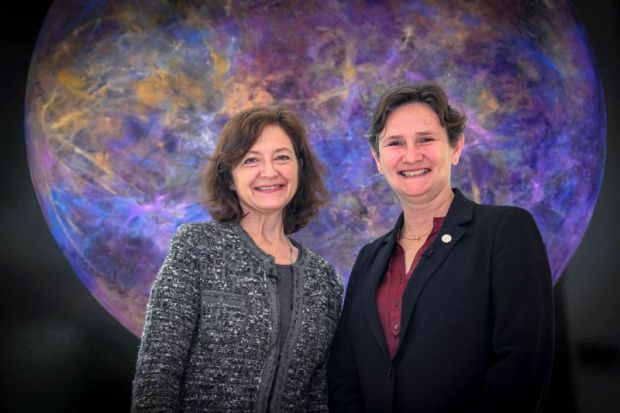The heads of two of the UK’s leading universities have warned against the career “rigidity” keeping women from reaching their full potential, on par with men, in academic jobs.
Vice-chancellors of the University of Cambridge and the University of Oxford – both women for the first time – emphasised the need to foster an academic environment that prevents female academics from falling off the bandwagon at a joint panel session at the Women in STEM festival, hosted by Murray Edwards College on 27 October.
“Rigidity is the enemy here,” said Deborah Prentice, the newly appointed vice-chancellor at the University of Cambridge.
“If it’s a pipeline where…nobody can enter the pipeline after 15…you can only lose people; that’s a disaster. Because there are all sorts of reasons why you lose people, and then they can’t get back in.”
Unlike men, who are often socialised to follow the “straight and narrow” career paths, women often need to step back, she added, alluding to setbacks due to maternity leave and childcaring duties, which can push women off the academic ladder.
More ramps back into academia, and the ability to “upshift and downshift” during one’s career, were sorely needed, Professor Prentice added.
“By enabling women to de-emphasise their career for a while – not leave it, but de-emphasise it – people can have an incredible blossoming of their career,” she said.
Oxford vice-chancellor Irene Tracey agreed that a rethink of careers in general was needed.
While there exists a “porosity between the public and private sectors”, the transition from academia into industry “shouldn’t be a one-way street”, she said. Rather, women should be able to re-join the academic track.
For instance, one solution could be a six-month secondment for scholars wherein they could take time away from their day jobs and “not be penalised for that”.
Both leaders noted the effects of stereotypes that shape a career trajectory very early on – in many cases, long before a woman’s scientific career even begins.
“There’s a deskilling that goes on probably a lot earlier than we think,” said Professor Tracey, mentioning an example of children asked to draw an astronaut – an exercise that shows the powerful effects of biases in how they affect perception over what a “scientist” looks like.
To address the early segregation of young men and women into scientific and non-scientific subjects, a pilot scheme involving a couple of hundred students was helping to inject more sciences into the humanities, and vice versa, she said.
Focused on tackling climate change, she said, it also had another motive: to “upskill” students in areas that were not their own, giving maths backgrounds to future journalists and a facility with words to scientists who “can’t write for toffee”. It was also “light touch” to prevent from interfering with degree courses.
But even when they were set on the right path and equipped with the knowledge, women must be emboldened to advocate for themselves, Professor Tracey emphasised.
As an adviser receiving letters from students wanting to discuss their careers, she said she found there was a “striking” difference in the sort of students who approached or did not approach her.
“No woman ever booked an appointment,” she said. “If you don’t ask the question and encourage it, then they just fall away.”
Register to continue
Why register?
- Registration is free and only takes a moment
- Once registered, you can read 3 articles a month
- Sign up for our newsletter
Subscribe
Or subscribe for unlimited access to:
- Unlimited access to news, views, insights & reviews
- Digital editions
- Digital access to THE’s university and college rankings analysis
Already registered or a current subscriber? Login








